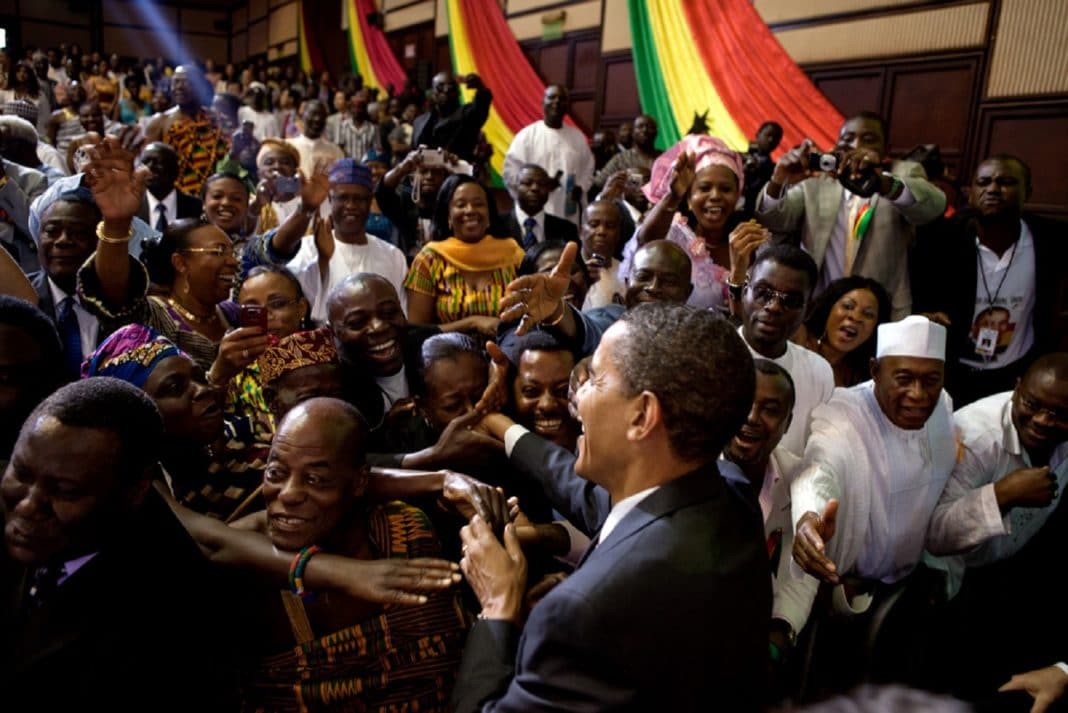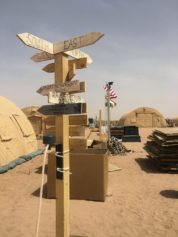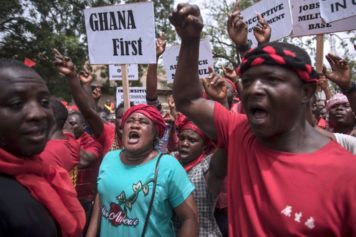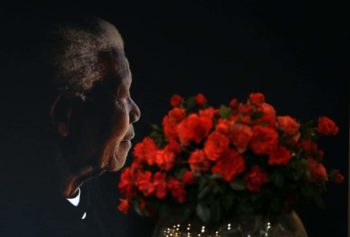
President Obama, pictured here when he addressed the Ghanaian Parliament in Accra, is scheduled to speak at the annual Nelson Mandela Annual Lecture in South Africa. (photo: Flickr)
Former President Barack Obama is scheduled to speak at an event in South Africa in honor of the late Nelson Mandela in July. There has been mounting pressure for the Nelson Mandela Foundation to rescind the invitation they extended to Obama to deliver the organization’s annual lecture — an event coinciding with the hundredth birthday of the late South African president and anti-apartheid leader, as Al Jazeera reported.
The 2018 Nelson Mandela Annual Lecture will take place on July 17 at Bidvest Wanderers Stadium in Johannesburg, according to the foundation, with an expected attendance of 9,000 people. World leaders use the annual lecture to address issues impacting South Africa, the continent, and the world. This year’s theme is “Renewing the Mandela Legacy and Promoting Active Citizenship in a Changing World.”
“The Nelson Mandela Annual Lecture will focus on creating conditions for bridging divides, working across ideological lines, and resisting oppression and inequality,” the foundation said on its website. “For most of his life, Nelson Mandela fought for democracy and equality. His presidency was defined by his efforts to solidify the fragile democracy of South Africa, and by his lessons on the politics of bridge-building over the politics of division.”
The @NelsonMandela Foundation is honoured to announce that President Barack Obama accepted our invitation to be the speaker at this year’s The 16th Nelson Mandela Annual Lecture to take place in Johannesburg on 17 July, ahead of Madiba’s birthday – @SelloHatang @ObamaFoundation pic.twitter.com/HFdgk1YJ9h
— NelsonMandela (@NelsonMandela) April 23, 2018
In an open letter to the Nelson Mandela Foundation, the Muslim advocacy organization CAGE Africa urged the NGO to withdraw the speaking invitation because, in the words of the group, Obama presided over a war on terror in Africa that has amounted to “an invasion, an occupation,” with drone attacks and special operations. CAGE Africa links the former president to war crimes, including “torture, arbitrary imprisonment and rendition, and extrajudicial killings through indiscriminate drone and air attacks that have killed thousands of innocent civilians, mainly Muslims, in the name of ‘fighting terrorism.’”
Under Obama, the organization asserts, there was an increased militarization of U.S. involvement on the continent, including more troops, bases, missions and resources. In addition, there was a 200 percent increase in military missions during Obama’s tenure and boosts in military expenditures combined with increases from the U.S. Agency for International Development (USAID), a “modern colonial project to further US interests especially regarding access to natural resources like oil,” according to CAGE. In addition, NATO engaged in regime change in Libya with the removal of Muammar Qadaffi and setting the stage for ISIS to enter. The first Black president admitted his “worst mistake” was intervening in Libya and failing to plan ahead, which led to that African nation becoming a failed state in which Africans have been sold into slavery in recent years.
Meanwhile, the United States waged a campaign in Somalia, with CIA involvement, drones and “interrogation chambers.” This as Obama supported dictators such as Ugandan President Yoweri Museveni, known for violence and displacement of 2 million Ugandans, CAGE Africa says in its letter.
“Barack Obama, despite the world’s high hopes for him, rather than being the champion of human rights as he will no doubt cast himself to be during his upcoming lecture as your guest, has in fact ensured that the United States has set an unacceptable low moral standard when it comes to human rights and the dignity of local populations globally,” reads the letter. CAGE Africa further characterizes the Obama years as a time when the president and his supporters encouraged a new type of colonialism and spread “fear, violence and destruction“ in Africa, a violent approach that has been replicated by leaders throughout Africa and beyond through a network of prisons used to intimidate, torture and kill mostly Muslims.
Critics have found fault with Obama for maintaining the militarized approach to foreign affairs of former presidents Bush and Clinton, ramping up the United States Africa Command, or AFRICOM, and the U.S. military presence in Africa at the expense of economic affairs, all while pursuing an agenda that benefited the arms industry and big business.
With the election of America’s first Black president, the rise of Barack Obama, whose father was Kenyan, brought a great sense of hope and pride to many African nations, with many places throughout the continent named after him. A lack of a strong Obama Africa policy was a disappointment for critics who claim George W. Bush did more for Africa, even fostering a sense of abandonment which may be attributed to the domestic political calculations of a Black president who did not want to appear to show favoritism to African countries.
Bush’s work in fighting AIDS and malaria was reportedly “transformative” and saved millions of African lives. In 2015, Obama allocated an additional $300 million to the Bush-era program to fight HIV infection among women and girls in 10 sub-Saharan countries. President Obama also devoted resources to address the West African Ebola outbreak and signed a reauthorization of the African Growth and Opportunity Act, a measure first enacted under Clinton and later expanded by Bush allowing for duty-free imports to the U.S. from sub-Saharan nations.
Despite the substantial economic growth on the continent, U.S. engagement with Africa prioritized security over economic development, human rights, and promotion of democracy under the 44th president, as China entered to fill the void with billions of dollars in trade and investment, albeit with a defense and security strategy to match its economic interests. Obama emphasized “trade, not aid” as the fundamentals of his Africa policy.
The $8 billion that 47 sub-Saharan African nations received in U.S. aid in 2015 through USAID and the U.S. State Department was less than the combined assistance provided to Afghanistan ($5.5 billion, of which $3.7 billion is security-related) and Israel ($3.1 billion in military aid). Health and humanitarian aid, including economic and development assistance, account for 80 percent of U.S. aid to Africa. The Obama administration also established military outposts in over 10 African nations, including Uganda, Gabon, Ghana, Mali, Senegal, Djibouti, and a $100 million drone base in Niger. In addition, the Export-Import Bank of the United States approved more than $6.3 billion in financing for American exports to sub-Saharan Africa.
The Obama administration’s programs in Africa include Power Africa — which was designed to expand electricity throughout Africa and last year announced a $1 billion investment in Nigeria’s power sector — and Feed the Future, a $3 billion program with the goal of food security. In addition, Obama launched the Young African Leaders Initiative (YALI), which has provided 250,000 young African people with training, networking and skills development to prepare them for leadership roles.
YALI has faced criticism for targeting young entrepreneurs, as opposed to politicians — like the China model — and forgoing the opportunity to work on political processes and instill democratic ideals. Presently, the Obama Foundation’s yearlong Africa program, which launches in July, will train 200 young people for roles in government, business and civil society.
These talented young people will create a better future not just in Africa, but around the world. I can’t wait to spend some time with @ObamaFoundation Leaders and look forward to honoring the Mandela legacy in Johannesburg this summer. https://t.co/b73wGIW4Gj
— Barack Obama (@BarackObama) April 23, 2018
“I think Obama is an empowerer of young people. I think of him as somebody who has given young people a platform to express ourselves, a platform to display our leadership,” Vitumbiko Zgambo, an organic farmer from Malawi, told Voice of America.
Some critics believe Obama was more empty symbolism in Africa than anything else. “The unrealistic expectations that the U.S. president would transform Africa’s fortunes had not even come close to fruition. American policy towards Africa continued to lack consistent Congressional support, while Africa remained at the bottom of U.S. policy priorities,” Adekeye Adebajo, director of the Institute for Pan-African Thought and Conversation at the University of Johannesburg, wrote in The Guardian (Nigeria). While Adebajo acknowledged the successes of Obama in Africa —including increasing the number of Africans treated for HIV/AIDS from 1.7 million in 2008 to 6.7 million by 2013 — he also pointed out the shortfalls — such as oil and gas constituting 52 percent of African exports to the United States — and concluded the president failed to remake Africa, America or the world.
“As an individual, Obama has remained widely popular across Africa,” Adebajo noted. “But, the early lustre of Obamamania clearly faded, as the realization gradually dawned on Africans that even a powerful leader with close family ties to the continent could not change six decades of ‘malign neglect’ of their continent by Washington. The tragedy of this tale is that the enduring continuity of U.S. foreign policy has trumped the early idealism of an extraordinary individual of African ancestry.”
“By the end of his first term in office as President of the US, the uniqueness of the first African-American president had substantially faded. There was widespread cynicism and distrust about his attempts to use his family history to claim some special affinity for our continent,” said Ibrahim Vawda of the South Africa-based Media Review Network in an open letter to the Nelson Mandela Foundation. Vawda said it was “absurd and hypocritical” for Obama to say he promoted democracy in Africa. “Obama pursued the same predatory and criminal policies that provoked international anger and hatred under his predecessor George W. Bush. His own presidency was even more deeply mired in international criminality than that of Bush,” he added, citing drone assassinations and massive NSA spying operations.
President Obama made more visits to Africa than any of his predecessors, including four visits, seven nations, and the first American president to visit Kenya and Ethiopia, and hosted the first of its kind U.S.-Africa Leaders Summit with African heads of state and government in Washington in 2014. A follow-up to Obama’s 2013 trip to Africa, the summit focused on investment, trade, democracy and security ties in Africa. He was also known for providing advice to African nations that was interpreted by some African observers as the stance of a colonizer lecturing the natives — echoing the “tough love” he was accused of giving African-American audiences. During his first African visit in 2009, Obama urged Africans to take responsibility as a precondition for U.S. aid. “We must start from the simple premise that Africa’s future is up to Africans,” Obama said in Ghana, adding that despite its sins, “the West is not responsible for the destruction of the Zimbabwean economy over the last decade, or wars in which children are enlisted as combatants.” A prosperous future for Africa, he said, depends on taking on poverty and disease and eliminating tyranny and corruption. “These things can only be done if you take responsibility for your future,” he told the Ghanaian Parliament in Accra. “And it won’t be easy. It will take time and effort. There will be suffering and setbacks. But I can promise you this: America will be with you every step of the way, as a partner, as a friend.”
In 2015, Obama, the first sitting president to visit the African Union, lectured leaders on stepping down from power once their terms are over. “Nobody should be president for life,” Obama said to the 54-member AU headquartered in Addis Ababa. “I don’t understand why people want to stay so long, especially when they have got a lot of money,” he added. “Sometimes you will hear leaders say ‘I’m the only person who can hold this nation together.’ If that’s true, then that leader has failed to truly build their nation.”
This Mandela lecture would be the most significant speech Obama has given since leaving the White House. While Obama — who eulogized Mandela in 2013 and said the South African leader “makes me want to be a better man” — is criticized for focusing on African development late in his administration, he has been cited for laying the groundwork for improved U.S.-African ties. In contrast, his successor, Donald Trump, has been known for a decidedly different tone regarding Africa that included disparaging remarks about African countries. Following the deadly Unite the Right rally in Charlottesville, Virginia, Obama quoted Mandela in a tweet that became the most retweeted in history. “No one is born hating another person because of the color of his skin or his background or his religion … People must learn to hate, and if they can learn to hate, they can be taught to love … For love comes more naturally to the human heart than its opposite,” Obama tweeted, quoting Mandela.
“This year we thought: who can best represent the legacy of Madiba than the person whom we believe took on the baton when he became president of his own country. … Who can respond to the challenge?” said Sello Hatang, the CEO of the Nelson Mandela Foundation of the decision to select Obama. “We then kept on asking ourselves who would be able to deal with issues of democracy in a world that is ravaged by corruption‚ and it is the very thing that he was trying to fight against.”
Obama’s Africa policy, like the man himself, is complicated.


